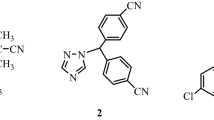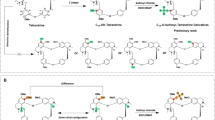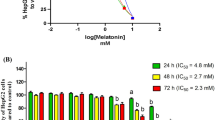Abstract
Aim:
Platycodin D, the main saponin isolated from Chinese herb Platycodonis Radix, exhibits anticancer activities against various cancer cell lines. Here we evaluated its anticancer action against human hepatocellular carcinoma cells in vitro and in vivo, and elucidated the relationship between platycodin D-induced apoptosis and autophagy.
Methods:
The viability of human hepatocellular carcinoma BEL-7402 cells was evaluated with MTT assay, and the apoptosis was examined using Annexin V/PI and Hoechst 33342 staining assays. Monodansylcadaverine (MDC) staining was used to label autophagic vacuoles. The proteins were detected using Western blot analysis. For studying its anticancer action in vivo, platycodin D (5 and 10 mg· kg−1·d−1) was intraperitoneally injected to BEL-7402-bearing mice for 21 days.
Results:
Platycodin D (5–40 μmol/L) inhibited the cell proliferation in vitro with IC50 values of 37.70±3.99, 24.30±2.30 and 19.70±2.36 μmol/L at 24, 48 and 72 h, respectively. Platycodin D (5–20 μmol/L) dose-dependently increased BEL-7402 cell apoptosis, increased the Bax/Bcl-2 ratio and the levels of cleaved PARP and cleaved caspase-3, and decreased the level of Bcl-2. Furthermore, platycodin D (5–20 μmol/L) induced autophagy in BEL-7402 cells, as evidenced by formation of cytoplasmic vacuoles, increased amounts of LC3-II, and increased numbers of MDC-positive cells. Pretreatment with the autophagy inhibitor chloroquine (5 μmol/L) or BAF (50 nmol/L) significantly enhanced platycodin D-induced proliferation inhibition and apoptosis. Moreover, platycodin D (20 μmol/L) activated the ERK and JNK pathways in BEL-7402 cells, and simultaneous blockage of the two pathways effectively suppressed platycodin D-induced autophagy and enhanced platycodin D-induced apoptosis. In BEL-7402-bearing mice, platycodin D (10 mg·kg−1•d−1) significantly reduced relative tumor volume with decreased body weight.
Conclusion:
Platycodin D not only inhibits the proliferation of BEL-7402 cells but also suppresses BEL-7402 xenograft tumor growth. Platycodin D-induced cell proliferation inhibition and apoptosis are amplified by co-treatment with autophagy inhibitors
Similar content being viewed by others
Log in or create a free account to read this content
Gain free access to this article, as well as selected content from this journal and more on nature.com
or
References
Park DI, Lee JH, Moon SK, Kim CH, Lee YT, Cheong J, et al. Induction of apoptosis and inhibition of telomerase activity by aqueous extract from Platycodon grandiflorum in human lung carcinoma cells. Pharmacol Res 2005; 51: 437–43.
Xie Y, Deng W, Sun H, Li D . Platycodin D2 is a potential less hemolytic saponin adjuvant eliciting Th1 and Th2 immune responses. Int Immunopharmacol 2008; 8: 1143–50.
Ahn KS, Noh EJ, Zhao HL, Jung SH, Kang SS, Kim YS . Inhibition of inducible nitric oxide synthase and cyclooxygenase II by Platycodon grandiflorum saponins via suppression of nuclear factor-kappaB activation in RAW 264.7 cells. Life Sci 2005; 76: 2315–28.
Kim YP, Lee EB, Kim SY, Li D, Ban HS, Lim SS, et al. Inhibition of prostaglandin E2 production by platycodin D isolated from the root of Platycodon grandiflorum. Planta Med 2001; 67: 362–4.
Choi SS, Han EJ, Lee TH, Lee JK, Han KJ, Lee HK, et al. Antinociceptive mechanisms of platycodin D administered intracerebroventricularly in the mouse. Planta Med 2002; 68: 794–8.
Lee H, Kang R, Kim YS, Chung SI, Yoon Y . Platycodin D inhibits adipogenesis of 3T3-L1 cells by modulating Kruppel-like factor 2 and peroxisome proliferator-activated receptor gamma. Phytother Res 2010; 24: S161–7.
Wu JT, Yang GW, Zhu WX, Wen WJ, Zhang FM, Yuan JD, et al. Anti-atherosclerotic activity of platycodin D derived from roots of Platycodon grandiflorum in human endothelial cells. Biol Pharm Bull 2012; 35: 1216–21.
Ahn KS, Hahn BS, Kwack KB, Lee EB, Kim YS . Platycodin D-induced apoptosis through nuclear factor-kappa B activation in immortalized keratinocytes. Eur J Pharmacol 2006; 537: 1–11.
Chun J, Joo EJ, Kang M, Kim YS . Platycodin D induces anoikis and caspase-mediated apoptosis via p38 MAPK in AGS human gastric cancer cells. J Cell Biochem 2013; 114: 456–70.
Chun J, Kim YS . Platycodin D inhibits migration, invasion, and growth of MDA-MB-231 human breast cancer cells via suppression of EGFR-mediated Ala and MAPK pathways. Chem-Biol Interact 2013; 205: 212–21.
Kim MO, Moon DO, Choi YH, Lee JD, Kim ND, Kim GY . Platycodin D induces mitotic arrest in vitro, leading to endoreduplication, inhibition of proliferation and apoptosis in leukemia cells. Int J Cancer 2008; 122: 2674–81.
Kim MO, Moon DO, Choi YH, Shin DY, Kang HS, Choi BT, et al. Platycodin D induces apoptosis and decreases telomerase activity in human leukemia cells. Cancer Lett 2008; 261: 98–107.
Qin H, Du X, Zhang Y, Wang R . Platycodin D, a triterpenoid saponin from Platycodon grandiflorum, induces G2/M arrest and apoptosis in human hepatoma HepG2 cells by modulating the PI3K/Akt pathway. Tumour Biol 2014; 35: 1267–74.
Tang ZH, Li T, Gao HW, Sun W, Chen XP, Wang YT, et al. Platycodin D from Platycodonis Radix enhances the anti-proliferative effects of doxorubicin on breast cancer MCF-7 and MDA-MB-231 cells. Chin Med 2014; 9: 16.
Li T, Xu WS, Wu GS, Chen XP, Wang YT, Lu JJ . Platycodin D induces apoptosis, and iInhibits adhesion, migration and invasion in HepG2 hepatocellular carcinoma cells. Asian Pac J Cancer P 2014; 15: 1745–9.
Li T, Tang ZH, Xu WS, Wu GS, Wang YF, Chang LL, et al. Platycodin D triggers autophagy through activation of extracellular signal-regulated kinase in hepatocellular carcinoma HepG2 cells. Eur J Pharmacol 2015; 749: 81–8.
Pardo R, Lo Re A, Archange C, Ropolo A, Papademetrio DL, Gonzalez CD, et al. Gemcitabine induces the VMP1-mediated autophagy pathway to promote apoptotic death in human pancreatic cancer cells. Pancreatology 2010; 10: 19–26.
Levine B . Cell biology: autophagy and cancer. Nature 2007; 446: 745–7.
Chen P, Cescon M, Bonaldo P . Autophagy-mediated regulation of macrophages and its applications for cancer. Autophagy 2014; 10: 192–200.
White E . Deconvoluting the context-dependent role for autophagy in cancer. Nat Rev Cancer 2012; 12: 401–10.
Menon MB, Kotlyarov A, Gaestel M . SB202190-induced cell type-specific vacuole formation and defective autophagy do not depend on p38 MAP kinase inhibition. PLoS One 2011; 6: e 23054.
Kitanaka C, Kuchino Y . Caspase-independent programmed cell death with necrotic morphology. Cell Death Differ 1999; 6: 508–15.
Yoon YH, Cho KS, Hwang JJ, Lee SJ, Choi JA, Koh JY . Induction of lysosomal dilatation, arrested autophagy, and cell death by chloroquine in cultured ARPE-19 cells. Invest Ophthalmol Vis Sci 2010; 51: 6030–7.
Amaravadi RK, Yu DB, Thomas-Tikhonenko A, Thompson CB . Chloroquine inhibits autophagy, enhances p53-dependent apoptosis, and delays tumor recurrence in a mouse model of B cell lymphoma. Blood 2005; 106: 681–9.
Mizushima N, Yoshimori T . How to interpret LC3 immunoblotting. Autophagy 2007; 3: 542–5.
Shi Y, Han JJ, Tennakoon JB, Mehta FF, Merchant FA, Burns AR, et al. Androgens promote prostate cancer cell growth through induction of autophagy. Mol Endocrinol 2013; 27: 280–95.
Shinojima N, Yokoyama T, Kondo Y, Kondo S . Roles of the Akt/mTOR/p70S6K and ERK1/2 signaling pathways in curcumin-induced autophagy. Autophagy 2007; 3: 635–7.
Duncia JV, Santella JB, Higley CA, Pitts WJ, Wityak J, Frietze WE, et al. MEK inhibitors: The chemistry and biological activity of U0126, its analogs, and cyclization products. Bioorg Med Chem Lett 1998; 8: 2839–44.
Sui XB, Kong N, Ye L, Han WD, Zhou JC, Zhang Q, et al. p38 and JNK MAPK pathways control the balance of apoptosis and autophagy in response to chemotherapeutic agents. Cancer Lett 2014; 344: 174–9.
Davis RJ . Signal transduction by the JNK group of MAP kinases. Cell 2000; 103: 239–52.
Bennett BL, Sasaki DT, Murray BW, O'Leary EC, Sakata ST, Xu W, et al. SP600125, an anthrapyrazolone inhibitor of Jun N-terminal kinase. Proc Natl Acad Sci U S A 2001; 98: 13681–6.
Huang M, Lu JJ, Huang MQ, Bao JL, Chen XP, Wang YT . Terpenoids: natural products for cancer therapy. Expert Opin Investig Drugs 2012; 21: 1801–18.
Lu JJ, Bao JL, Chen XP, Huang M, Wang YT . Alkaloids isolated from natural herbs as the anticancer agents. Evid Based Complement Alternat Med 2012; 2012: 485042.
Lu JJ, Bao JL, Wu GS, Xu WS, Huang MQ, Chen XP, et al. Quinones derived from plant secondary metabolites as anti-cancer agents. Anticancer Agents Med Chem 2013; 13: 456–63.
Chen X, Bao J, Guo J, Ding Q, Lu J, Huang M, et al. Biological activities and potential molecular targets of cucurbitacins: a focus on cancer. Anticancer drugs 2012; 23: 777–87.
Lu JJ, Dang YY, Huang M, Xu WS, Chen XP, Wang YT . Anti-cancer properties of terpenoids isolated from Rhizoma Curcumae--a review. J Ethnopharmacol 2012; 143: 406–11.
Park JC, Lee YJ, Choi HY, Shin YK, Kim JD, Ku SK . In vivo and in vitro antitumor effects of platycodin D, a saponin purified from platycodi radix on the H520 lung cancer cell. Evid Based Complement Alternat Med 2014; 2014: 478653.
Ghavami S, Hashemi M, Ande SR, Yeganeh B, Xiao W, Eshraghi M, et al. Apoptosis and cancer: mutations within caspase genes. J Med Genet 2009; 46: 497–510.
Ding Q, Bao J, Zhao W, Hu Y, Lu J, Chen X . Natural autophagy regulators in cancer therapy: a review. Phytochem Rev 2014: 1–18.
Tang ZH, Li T, Chang LL, Zhu H, Tong YG, Chen XP, et al. Glycyrrhetinic Acid triggers a protective autophagy by activation of extracellular regulated protein kinases in hepatocellular carcinoma cells. J Agric Food Chem 2014; 62: 11910–6.
Guo WJ, Zhang YM, Zhang L, Huang B, Tao FF, Chen W, et al. Novel monofunctional platinum (II) complex Mono-Pt induces apoptosis-independent autophagic cell death in human ovarian carcinoma cells distinct from cisplatin. Autophagy 2013; 9: 996–1008.
Yu L, McPhee CK, Zheng L, Mardones GA, Rong Y, Peng J, et al. Termination of autophagy and reformation of lysosomes regulated by mTOR. Nature 2010; 465: 942–6.
Johnson GL, Lapadat R . Mitogen-activated protein kinase pathways mediated by ERK, JNK, and p38 protein kinases. Science 2002; 298: 1911–2.
He W, Wang Q, Srinivasan B, Xu J, Padilla MT, Li Z, et al. A JNK-mediated autophagy pathway that triggers c-IAP degradation and necroptosis for anticancer chemotherapy. Oncogene 2014; 33: 3004–13.
Acknowledgements
This work was supported by the Macao Science and Technology Development Fund (070/2013/A), the Research Fund of University of Macau (MRG008-LJJ2014-ICMS MYRG2015-00091-ICMS-QRCM, and MYRG2015-00101-ICMS-QRCM), and the State Key Laboratory of Drug Research (SIMM1403KF-11).
Author information
Authors and Affiliations
Corresponding author
Rights and permissions
About this article
Cite this article
Li, T., Xu, Xh., Tang, Zh. et al. Platycodin D induces apoptosis and triggers ERK- and JNK-mediated autophagy in human hepatocellular carcinoma BEL-7402 cells. Acta Pharmacol Sin 36, 1503–1513 (2015). https://doi.org/10.1038/aps.2015.99
Received:
Accepted:
Published:
Issue date:
DOI: https://doi.org/10.1038/aps.2015.99
Keywords
This article is cited by
-
Impaired autophagy contributes to the aggravated deterioration of osteoarthritis articular cartilage by peroxisome proliferator-activated receptor α deficiency, associated with decreased ERK and Akt activation
European Journal of Medical Research (2023)
-
Saponins as cytotoxic agents: an update (2010–2021). Part II—Triterpene saponins
Phytochemistry Reviews (2023)
-
Platycodin D inhibits the proliferation and migration of hypertrophic scar-derived fibroblasts and promotes apoptosis through a caspase-dependent pathway
Archives of Dermatological Research (2022)
-
Terpenoids’ anti-cancer effects: focus on autophagy
Apoptosis (2021)
-
Dissipative Particle Dynamics Study on Platycodin’s Solubilization Enhancing Effect Towards Five Drug Components
Chemical Research in Chinese Universities (2019)



